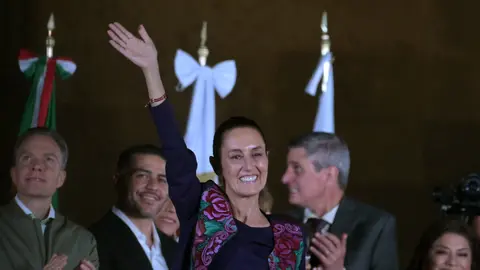A woman in the Presidency of Mexico

In the more than two hundred years since Mexico became an independent country and after 65 presidents, on 2 June a total of 35.5 million Mexicans voted for Sheinbaum in an election in which it was a foregone conclusion that a woman would become president for the first time.
A total of 59,307,000 people voted out of a nominal list of 98,517,000 people in a race to elect the president and another 20,708 positions of popular representation, given that the Congress, Senate, 9 governorships and many mayorships were also renewed.
Xóchitl Gálvez, who fought against Sheinbaum for the Fuerza y Corazón por México coalition (an improbable sum that united parties from the right, centre and centre-left), first conceded defeat on election day and, 24 hours later, announced that she would contest the results.
Gálvez objects that the election was marred by the involvement of organised crime, threats and assassinations of candidates in several states where public office was up for grabs. A total of 34 people were murdered, including candidates and aspirants to public office.
Never before in the history of Mexican democracy had so many people been threatened and murdered for aspiring to run for public office.
The New York Times itself devoted an extensive report to point out the enormous number of candidates massacred in the 2023-2024 electoral process at the hands of organised crime.
It is not known whether Gálvez will succeed in challenging the elections after first acknowledging her defeat and then taking a step back; INE itself is still counting the votes and indicates that the opposition leader would have obtained just over 15 million votes, less than half of those obtained by Sheinbaum.
Of course, uncertainty is always a bad advisor, especially for the economy, financial markets and investor decision-making.
The peso and the Mexican Stock Exchange have already reacted to the election results of Sunday 2 June: the former with an average depreciation of 4% against the dollar and 4.11% against the euro, and the latter with a loss of 6.11%, its worst fall since March 2020.
Some analysts speak of a ‘natural’ reaction of the markets that do not want another MORENA government and executives such as Gabriela Siller, director of economic analysis at Banco Base, warn that the Mexican economy has gone from a ‘phase of fear’ to one of ‘panic’.
Why is Sheinbaum scared? Because of the possibility that at the end of the vote count her party MORENA will have a majority in Congress (made up of 500 deputies) and will also gain significant control of the Senate.
That would mean giving the new president a large margin of action and legislative control to push through a number of reforms that are unpopular with capital, but popular with the lower classes.
During her victory rally, Sheinbaum affirmed that in her government the first floor of the Fourth Transformation will be built and promised to work first for the poor.
The UNAM-trained physicist with a PhD has a solid political career and has won several elections, including the Mexico City mayoralty. Her parents have Jewish roots, but above all she has a deep communist background and convictions.
As a teenager she was an avowed Marxist-Leninist, something that distinguishes her from the current president, Andrés Manuel López Obrador; although they founded the MORENA party together, López Obrador is a populist in the style of the PRI of the 1970s and 1980s. In fact, AMLO, as he is popularly known, was a PRI militant, until he realised that he would never get the PRI's support to become governor of his native Tabasco, and thus embarked on his own race against the PRI officialdom of the time.
Sheinbaum has already hinted that some reforms will come and that she will have a very feminist agenda: ‘In relation to gender violence she assured that during her administration she will send a proposal to Congress to raise to constitutional rank the substantive equality of women in all its forms and the right to a life free of violence, as well as legal reforms to guarantee equal cabinets, the eradication of the wage gap, the creation of specialised prosecutors for feminicide and the obligation that every death of a woman to be investigated as a feminicide’.
But she is also committed to following up on all the reforms that AMLO will not be able to push through, for example: ‘Raising to constitutional status programmes such as the pension for the elderly or the Youth Building the Future programme, to the prohibition of animal abuse, the fentanyl trade, fracking for mining, the use of factureras and that the National Guard remains in the hands of the Army’.
AMLO's reforms that Sheinbaum could carry out also include: ‘Eliminating autonomous constitutional bodies such as the Federal Economic Competition Commission; the Federal Telecommunications Institute; the National Commission for the Continuous Improvement of Education; the Energy Regulatory Commission and the National Hydrocarbons Commission. And, in addition, to achieve the merger of the National Council for the Evaluation of Social Development Policy with INEGI.
Of course, all reforms and even alterations to the Constitution could be achieved if they have the constitutional majority to do so in both Houses.
What's next for Mexico? A continuation of the austerity in which it has found itself for years, with a fight against corruption and a very feminist government.
Nothing is known about what Sheinbaum's government will do to address the major national and social issues such as: the more than 100,000 people who have disappeared; human trafficking and the power of drug trafficking throughout the country, as well as the enormous violence and insecurity.
Nor is it known what stance Mexico will take internationally with President Claudia; she has reiterated at some campaign rallies that her government will not be like AMLO's. It is not known whether this means that she will be a ‘president of Mexico’ or not.
It is not known whether this means that she will be seen at international summits and will travel abroad for bilateral state visits not only with the United States and Canada, but also with the rest of the countries on different continents.
López Obrador has not visited Europe in almost six years of his government and has not spoken to the Spanish president, Pedro Sánchez, since 2020. Much less has he spoken to King Felipe VI, the Spanish head of state, after that letter in which he asked for a historic pardon for the Conquest. Will Sheinbaum also demand a historic pardon from King Felipe VI? Or perhaps she will decide to turn the page.
Meanwhile, with the EU, the ratification of the EU-Mexico Global Agreement is pending, the modernisation of which must be approved by each of the 27 member countries in their respective parliaments. It should have been ready last year, but was not.
Nor is it known what stance Mexico will take with Sheinbaum on Israel's war against Hamas in Gaza, or whether she will end up supporting Ukraine in the face of the invasion by Russian troops. Interestingly, Sheinbaum spent time on her X account responding to the international leaders and leaders who tweeted her congratulations. Zelenski followed suit with a message in Spanish expressing his desire for an early rapprochement. Sheinbaum did not reply to his congratulations.
Mexico has its first woman in the presidency and this opens a series of unknowns between continuity, doubts, uncertainty and a business class and middle class that are already packing their suitcases to continue their diaspora to the United States, Canada, Spain, France or the United Kingdom as their favourite destinations.


